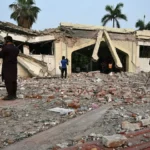Operation Sindoor was a coordinated 25-minute attack, utilizing precision weapons such as the SCALP missile and HAMMER bomb, targeting nine terrorist camps in Pakistan and Pakistan-occupied Kashmir (PoK).
New Delhi:
Over 100 terrorists were killed in Operation Sindoor, India’s military response to Pakistan and the Pahalgam terror attack, Defence Minister Rajnath Singh informed opposition leaders during an all-party meeting on Thursday.
Singh also noted that Operation Sindoor is still ongoing, with the Indian military prepared to respond to any escalation by Pakistan. While India does not wish to escalate the situation further, Singh emphasized that the country will retaliate if attacked by enemy forces.
Reports suggest that Pakistan may be considering its own military response.
The opposition, meanwhile, reiterated its support for the government in the fight against cross-border terrorism. Congress President Mallikarjun Kharge, speaking to the media, assured the government of full support, saying, “We heard what they said… they also mentioned some information that must remain confidential. We said ‘we are all with the government’.”
The meeting was conducted in a cordial atmosphere, with Parliamentary Affairs Minister Kiren Rijiju praising the maturity shown by all leaders, noting that there was no bickering.
On Wednesday evening, government sources reported that 70 terrorists had been killed in the operation. Sources also stated that key terrorist infrastructure had been dismantled in the targeted areas.
Operation Sindoor, a synchronized 25-minute strike, used precision weapons such as the SCALP missile and HAMMER bomb to hit nine terror camps in Pakistan and Pakistan-occupied Kashmir (PoK).
The targets included the headquarters and training camps of Lashkar-e-Taiba and Jaish-e-Mohammed. These groups were linked to the Pahalgam attack, in which 26 people, including civilians, were killed, and the 2019 Pulwama attack that claimed the lives of 40 soldiers.
The operation was conducted based on “credible intelligence and the involvement of these groups in cross-border terrorism,” explained Colonel Sofiya Qureshi of the Indian Army during a press briefing on Wednesday.
Importantly, no Pakistani military establishments were targeted, and the operation was carefully timed to minimize civilian casualties, Colonel Qureshi said. Wing Commander Vyomika Singh of the Air Force also confirmed that the Indian military is prepared in case Pakistan retaliates.
The strikes followed the Pahalgam attack on April 22, in which 26 individuals, including a 70-year-old retiree, were killed at a popular tourist spot in Jammu and Kashmir. Many were shot at point-blank range in front of their families, triggering widespread outrage. India has accused Pakistan of harboring the terrorists responsible, a claim Islamabad denies, calling for an international investigation.
During a United Nations Security Council meeting last week, Pakistan was questioned about the continued presence of groups like Lashkar-e-Taiba operating from its territory.
In addition to military actions, India has implemented a range of non-military measures against Pakistan, including suspending specific types of visas and putting the 1960 Indus Waters Treaty (IWT) on hold. The IWT, which regulates the distribution of water from the Indus River and its tributaries, is vital to Pakistan’s agriculture, and its suspension has been described as “an act of war” by Pakistan, which in turn suspended the 1972 Simla Agreement, concerning the Line of Control.
Since the Pahalgam attack, Pakistan has carried out daily cross-border shelling, killing 13 people, including a soldier. The areas targeted by the Pakistani Army include Uri, Kupwara, Baramulla, and Akhnoor, all located along the LoC. The Indian Army has responded proportionately to these attacks, according to government officials.









